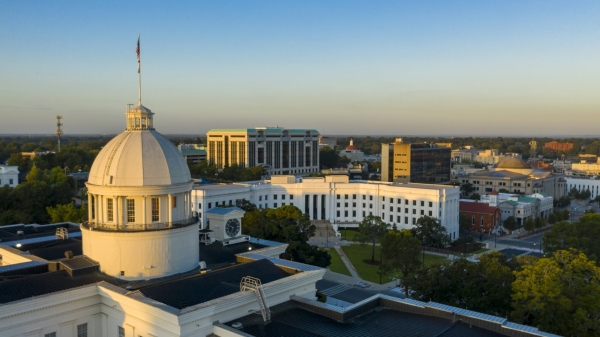U.S. Representative Terri Sewell, D-Alabama, discussed threats to rural healthcare access in Alabama during a Thursday livestream event.
Sewell was joined for the event entitled “Terri Talks: Rural Healthcare in Crisis” by Rural Health Medical Program Inc. CEO Keshee Dozier-Smith.
RHMPI is part of a nationwide network of Federally Qualified Health Centers established beginning in the late 60s during President Lyndon B. Johnson’s War on Poverty.
The organization, based in Selma, established its first community health center in Uniontown, Alabama, in 1977, located within the city’s public housing authority.
RHMPI has since opened community health center locations throughout the Black Belt, including a mobile health unit and sites in Dallas County, Demopolis, Marion, Monroeville, Pine Apple, Thomaston, Thomasville and Yellow-Bluff.
Community health centers, such as those run by RHMPI, are non-profits, funded primarily through the Health Resources and Services Administration, which provide primary medical and dental services to the local community regardless of a patient’s insurance status.
Alabama is home to 138 community health centers, which operate in medically underserved areas.
Sewell opened the livestream event by highlighting the impacts of federal policies on rural healthcare access.
“We know that our rural hospitals and health centers are already facing unprecedented challenges here in Alabama. But sadly, politicians in Washington are working to make the situation even worse,” Sewell said.
“We know that Medicaid is a lifeline for so many of the people in Alabama, especially our children, our seniors and the disabled,” Sewell said, citing that roughly half of births in the state are covered by Medicaid and more than 68 percent of nursing home patients relied on the program in 2024.
“But Medicaid isn’t just important to individuals. It’s also a lifeline for our rural hospitals, many of which are already struggling to keep their doors open,” the congresswoman added. “Because state officials have refused to expand Medicaid, Alabama already has a bare bone, minimum Medicaid program—one that has accelerated the closure of rural hospitals throughout our state.”
States, such as Alabama, which have not expanded Medicaid, are home to nearly 30 percent of all rural hospitals, 53 percent of which are operating at a financial loss, according to a February study from healthcare consulting firm Chartis.
Sewell went on to point to the One Big Beautiful Bill Act’s $911 billion cut to Medicaid spending over the next ten years. The OBBBA also included $50 billion for rural healthcare investments; however, according to a report from the healthcare nonprofit, Kaiser Family Foundation, this amount accounts for one-third of the estimated loss of federal Medicaid funding rural areas will face over the next ten years.
The representative also highlighted the expiration of Affordable Care Act Enhanced Premium Tax Credits, or ePTCs, which she said are utilized by 53,000 individuals in the 7th congressional district alone. The expiration of ePTCs at the end of 2025 has been projected to more than double average annual premiums for ACA Healthcare Marketplace plan recipients.
“At a time when Americans are already dealing with rising costs, letting these tax credits expire would only push healthcare further out of reach for so many Alabama families,” Sewell said. “These healthcare cuts will push even more hospitals to the brink. Our hospitals will be forced to choose between eliminating essential services or even closing their doors. We simply cannot let this happen.”
Describing the work of her organization, Dozier-Smith highlighted how RHMPI relies on funding from both the U.S. Department of Health and Human Services and Medicaid. She explained that reductions in Medicaid funding and projected increases in ACA health insurance costs will hinder RHMPI’s ability both to provide medical services and economically support local communities.
“We hire locally; we put our money back into the community when we partner and collaborate with other local businesses,” Dozier-Smith said. “So, any type of funding delays or shortages impacts not only the work that we do for our patients, the job opportunities that we provide for those in the community, and also the partnerships and funds that we put back in our communities.”
Dozier-Smith emphasized that her organization has already seen an increase in uninsured patients, which, if exacerbated, will force RHMPI to halt planned improvements to its services and staffing in order to afford day-to-day care.
“That means a reduction in hours, a potential reduction in staff recruiting for the staff members we need to improve [our] workforce currently,” she said. “Any expansion in specialty care for our chronically ill patients in these rural communities that are unable to get to urban areas, it all gets placed on the back burner because we’re trying to provide just the primary services.”
Dozier-Smith went on to emphasize how community health centers help ensure the survival of rural hospitals by providing primary care services, regardless of an individual’s insurance status, and preventing uninsured individuals from making avoidable and uncompensated hospital visits.
“If that bill is $10 and $15,000 every time that chronically ill patient comes in and there’s no reimbursement, then that’s the deficit in that hospital’s bottom line each month,” said Dozier-Smith. “We can prevent patients from immediately going to the emergency room for things that are not urgent matters, but that are unmanaged primary care matters.”
Sewell closed the event by calling for expansion to hospital funding in the 2026 FY budget, as well as asking Dozier-Smith for her message to federal lawmakers on the importance of ACA and Medicaid access and funding.
“Protect and invest in rural communities,” Dozier-Smith responded. “Every policy decision made at the federal level affects families in rural Alabama; we are depending on you to make the right decisions for our communities and your families.”


















































